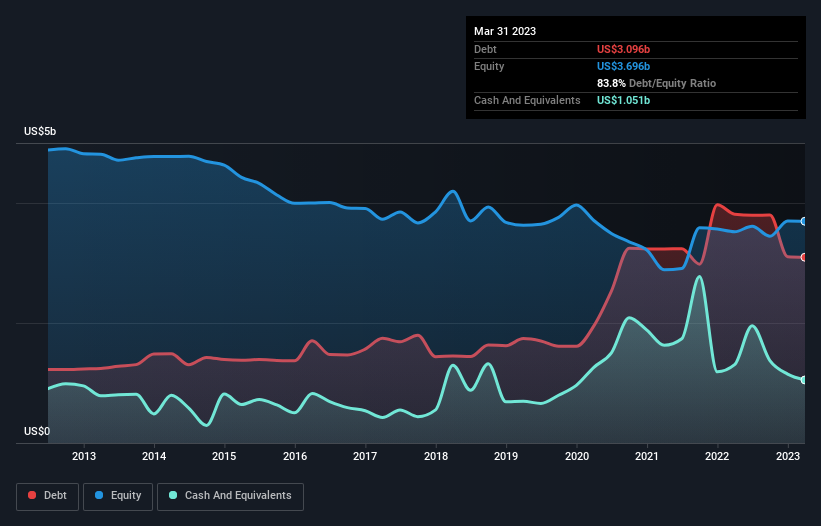- United States
- /
- Hospitality
- /
- NYSE:H
These 4 Measures Indicate That Hyatt Hotels (NYSE:H) Is Using Debt Reasonably Well
Legendary fund manager Li Lu (who Charlie Munger backed) once said, 'The biggest investment risk is not the volatility of prices, but whether you will suffer a permanent loss of capital.' So it seems the smart money knows that debt - which is usually involved in bankruptcies - is a very important factor, when you assess how risky a company is. We note that Hyatt Hotels Corporation (NYSE:H) does have debt on its balance sheet. But the real question is whether this debt is making the company risky.
Why Does Debt Bring Risk?
Debt assists a business until the business has trouble paying it off, either with new capital or with free cash flow. In the worst case scenario, a company can go bankrupt if it cannot pay its creditors. While that is not too common, we often do see indebted companies permanently diluting shareholders because lenders force them to raise capital at a distressed price. Of course, plenty of companies use debt to fund growth, without any negative consequences. When we examine debt levels, we first consider both cash and debt levels, together.
See our latest analysis for Hyatt Hotels
What Is Hyatt Hotels's Net Debt?
You can click the graphic below for the historical numbers, but it shows that Hyatt Hotels had US$3.10b of debt in March 2023, down from US$3.81b, one year before. On the flip side, it has US$1.05b in cash leading to net debt of about US$2.05b.

How Strong Is Hyatt Hotels' Balance Sheet?
The latest balance sheet data shows that Hyatt Hotels had liabilities of US$3.35b due within a year, and liabilities of US$5.58b falling due after that. Offsetting these obligations, it had cash of US$1.05b as well as receivables valued at US$828.0m due within 12 months. So it has liabilities totalling US$7.04b more than its cash and near-term receivables, combined.
This deficit isn't so bad because Hyatt Hotels is worth a massive US$12.0b, and thus could probably raise enough capital to shore up its balance sheet, if the need arose. However, it is still worthwhile taking a close look at its ability to pay off debt.
In order to size up a company's debt relative to its earnings, we calculate its net debt divided by its earnings before interest, tax, depreciation, and amortization (EBITDA) and its earnings before interest and tax (EBIT) divided by its interest expense (its interest cover). This way, we consider both the absolute quantum of the debt, as well as the interest rates paid on it.
Hyatt Hotels's net debt is sitting at a very reasonable 2.3 times its EBITDA, while its EBIT covered its interest expense just 5.4 times last year. While that doesn't worry us too much, it does suggest the interest payments are somewhat of a burden. We also note that Hyatt Hotels improved its EBIT from a last year's loss to a positive US$471m. When analysing debt levels, the balance sheet is the obvious place to start. But it is future earnings, more than anything, that will determine Hyatt Hotels's ability to maintain a healthy balance sheet going forward. So if you're focused on the future you can check out this free report showing analyst profit forecasts.
Finally, a business needs free cash flow to pay off debt; accounting profits just don't cut it. So it's worth checking how much of the earnings before interest and tax (EBIT) is backed by free cash flow. Happily for any shareholders, Hyatt Hotels actually produced more free cash flow than EBIT over the last year. That sort of strong cash conversion gets us as excited as the crowd when the beat drops at a Daft Punk concert.
Our View
When it comes to the balance sheet, the standout positive for Hyatt Hotels was the fact that it seems able to convert EBIT to free cash flow confidently. But the other factors we noted above weren't so encouraging. For example, its level of total liabilities makes us a little nervous about its debt. When we consider all the elements mentioned above, it seems to us that Hyatt Hotels is managing its debt quite well. Having said that, the load is sufficiently heavy that we would recommend any shareholders keep a close eye on it. The balance sheet is clearly the area to focus on when you are analysing debt. However, not all investment risk resides within the balance sheet - far from it. Case in point: We've spotted 3 warning signs for Hyatt Hotels you should be aware of.
At the end of the day, it's often better to focus on companies that are free from net debt. You can access our special list of such companies (all with a track record of profit growth). It's free.
Valuation is complex, but we're here to simplify it.
Discover if Hyatt Hotels might be undervalued or overvalued with our detailed analysis, featuring fair value estimates, potential risks, dividends, insider trades, and its financial condition.
Access Free AnalysisHave feedback on this article? Concerned about the content? Get in touch with us directly. Alternatively, email editorial-team (at) simplywallst.com.
This article by Simply Wall St is general in nature. We provide commentary based on historical data and analyst forecasts only using an unbiased methodology and our articles are not intended to be financial advice. It does not constitute a recommendation to buy or sell any stock, and does not take account of your objectives, or your financial situation. We aim to bring you long-term focused analysis driven by fundamental data. Note that our analysis may not factor in the latest price-sensitive company announcements or qualitative material. Simply Wall St has no position in any stocks mentioned.
About NYSE:H
Hyatt Hotels
Operates as a hospitality company in the United States and internationally.
High growth potential with very low risk.
Similar Companies
Market Insights
Community Narratives




